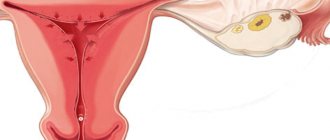Withdrawal bleeding for women who take oral contraceptives to prevent unwanted pregnancy is considered normal.
They should be warned about this by the attending physician who prescribes this or that drug.
As a rule, the annotations for contraceptives do not contain information on how to properly stop taking medications. Therefore, women believe that they can stop taking oral contraceptives on any day of the menstrual cycle.
Attention! This is wrong - you need to stop taking the pills only after the entire package is finished and your period comes. After this, the woman may no longer start a new package.
If you abruptly stop taking the pills, severe bleeding may occur, which is triggered by a sharp increase in hormonal levels.
What it is?
Withdrawal bleeding is artificially induced menstruation.
That is, a woman takes an oral contraceptive according to the schedule during the cycle, and after the drug is stopped, menstruation or withdrawal bleeding occurs.
If it is not profuse, there is no need to stop it, but if the bleeding lasts more than a week or the volume of blood lost is significant, you should consult a doctor to prescribe a hemostatic agent.
Important! The issue of discontinuing an oral contraceptive must be approached very responsibly, since in some cases, after withdrawal bleeding, a woman requires curettage, and this procedure postpones the possibility of conception for several months.
Breakthrough bleeding while taking OCs (oral contraceptives)
Bleeding while taking birth control pills is a common side effect of this group of drugs. If the bleeding is light, it can be considered a side effect of the body becoming accustomed to birth control pills.
Reference! According to statistics, 40% of women experience bloody spotting in the first couple of months of taking the drugs. In some cases, such an adaptation period can last six months, and in 5% of women it lasts for an even longer time.
If the bleeding is heavy and resembles menstruation, it is breakthrough bleeding.
The reasons for this phenomenon lie in the fact that during the adaptation period, atrophy of the endometrial layer increases. This is due to the influence of progesterones, while the estrogen concentration in the oral contraceptive is so low that it cannot provide a hemostatic function.
During the natural menstrual cycle, the level of estrogen in the female body increases, so endometrial detachment stops and menstruation ends. When taking synthetic hormones, these processes do not always go smoothly.
In addition, breakthrough bleeding can be caused by the following reasons:
- The presence of gynecological pathologies in a woman - uterine fibroids, endometriosis, polyps in the uterus and others.
- The bad habit of smoking has an anti-estrogenic effect, which means that women who smoke are more at risk of bleeding.
- Taking the pills incorrectly means abruptly stopping or skipping them.
- Concomitant use of certain medications with birth control pills.
- Vomiting or diarrhea, in which the absorption of drugs does not occur.
- Simultaneous use of oral contraceptives with herbal remedies based on St. John's wort.
- The presence of sexually transmitted infections.
- The presence of individual intolerance to the drug.
If you have finished taking birth control pills, but your period does not begin, and pregnancy tests are negative, you should immediately consult a doctor.
How to stop?
What to do if the discharge is too heavy and lasts for more than a week?
Of course, it is best to talk to your doctor about withdrawal bleeding.
Withdrawal bleeding: how long does it last after stopping taking OK, how to stop
Withdrawal bleeding for women who take oral contraceptives to prevent unwanted pregnancy is considered normal.
They should be warned about this by the attending physician who prescribes this or that drug.
As a rule, the annotations for contraceptives do not contain information on how to properly stop taking medications. Therefore, women believe that they can stop taking oral contraceptives on any day of the menstrual cycle.
Attention! This is wrong - you need to stop taking the pills only after the entire package is finished and your period comes. After this, the woman may no longer start a new package.
If you abruptly stop taking the pills, severe bleeding may occur, which is triggered by a sharp increase in hormonal levels.
What it is?
Withdrawal bleeding is artificially induced menstruation.
That is, a woman takes an oral contraceptive according to the schedule during the cycle, and after the drug is stopped, menstruation or withdrawal bleeding occurs.
If it is not profuse, there is no need to stop it, but if the bleeding lasts more than a week or the volume of blood lost is significant, you should consult a doctor to prescribe a hemostatic agent.
Important! The issue of discontinuing an oral contraceptive must be approached very responsibly, since in some cases, after withdrawal bleeding, a woman requires curettage, and this procedure postpones the possibility of conception for several months.
Breakthrough bleeding while taking OCs (oral contraceptives)
Bleeding while taking birth control pills is a common side effect of this group of drugs. If the bleeding is light, it can be considered a side effect of the body becoming accustomed to birth control pills.
Reference! According to statistics, 40% of women experience bloody spotting in the first couple of months of taking the drugs. In some cases, such an adaptation period can last six months, and in 5% of women it lasts for an even longer time.
If the bleeding is heavy and resembles menstruation, it is breakthrough bleeding.
The reasons for this phenomenon lie in the fact that during the adaptation period, atrophy of the endometrial layer increases. This is due to the influence of progesterones, while the estrogen concentration in the oral contraceptive is so low that it cannot provide a hemostatic function.
During the natural menstrual cycle, the level of estrogen in the female body increases, so endometrial detachment stops and menstruation ends. When taking synthetic hormones, these processes do not always go smoothly.
In addition, breakthrough bleeding can be caused by the following reasons:
- The presence of gynecological pathologies in a woman - uterine fibroids, endometriosis, polyps in the uterus and others.
- The bad habit of smoking has an anti-estrogenic effect, which means that women who smoke are more at risk of bleeding.
- Taking the pills incorrectly means abruptly stopping or skipping them.
- Concomitant use of certain medications with birth control pills.
- Vomiting or diarrhea, in which the absorption of drugs does not occur.
- Simultaneous use of oral contraceptives with herbal remedies based on St. John's wort.
- The presence of sexually transmitted infections.
- The presence of individual intolerance to the drug.
If you have finished taking birth control pills, but your period does not begin, and pregnancy tests are negative, you should immediately consult a doctor.
How to stop?
What to do if the discharge is too heavy and lasts for more than a week?
Of course, it is best to talk to your doctor about withdrawal bleeding.
But if this is not possible, you can try taking a double dose of the drug, for example, 1 tablet in the morning and evening:
- In this mode, it is recommended to drink the oral contraceptive until bleeding completely stops, and after that you need to return the previous dosage of the drug.
- Since oral contraceptives are supposed to be taken for 21-24 days, and the number of tablets in the blister corresponds to each day of administration, after taking a loading dose, there may not be enough tablets in the package.
- Therefore, you will have to purchase another blister.
Important! As soon as the opportunity arises to visit a gynecologist, this must be done, since breakthrough bleeding may indicate serious problems with the body or a pregnancy.
In the middle of the cycle
Bloody discharge during the intermenstrual period may indicate insufficient concentration of gestagen or estrogen. In this case, the oral contraceptive taken should be discontinued and replaced with a product with a higher concentration of the active substance.
Most often, bleeding in the middle of the cycle can be observed when taking the following microdose oral contraceptives:
- Jess;
- Logest;
- Novinet;
- Mercilon.
In some cases pink discharge , which indicates that the egg has been released from the follicle, therefore, the woman has a risk of becoming pregnant, despite the fact that she is taking a contraceptive drug. This is not a pathology, but only evidence that the drug being taken does not cope with its tasks.
If bleeding is observed from 6 to 12 days after ovulation , this may indicate pregnancy has already occurred. If bleeding begins when taking the last pills from the package, this indicates a lack of progesterone.
If bleeding begins immediately after starting to take pills from a new package (in the first days after the end of menstruation), this means that the body does not have enough estrogen, which should restore the uterine layer. All such violations must be reported to the attending physician.
What is intermenstrual bleeding when taking birth control pills is explained in the video:
How long does it normally last?
Normally, withdrawal bleeding that occurs after taking the last tablet from the package should last 3-5 days.
If bleeding continues for more than 7 days, this is a good reason to consult a doctor.
When taking Jess Plus
Jess Plus is a multiphase oral contraceptive, which, in addition to the main active ingredient, contains an additional one - calcium.
When taking this drug, patients may experience profuse bloody secretion, which appears more often over time and lasts longer. If such phenomena occur during the first time of taking the drug, they are not considered dangerous, and after the end of the adaptation period they go away on their own.
In addition, at the end of the cycle after taking Jess, there may be no menstrual bleeding at all; instead, spotting may be observed.
They are considered normal in the first three months. Their duration can be long - two weeks, this is also a variant of the norm, provided that the discharge is spotting and not abundant.
Possible negative effects
Side effects of taking Jess are the following:
- Breast engorgement during the first 2-3 cycles of taking the drug. After the body adapts to taking the oral contraceptive, this symptom should go away.
- Spotting during various periods of the cycle. This symptom also in most cases goes away after several cycles of use. If after 3 months a woman continues to observe it, she should consult a doctor - perhaps a stronger analogue will be prescribed.
- Increase or decrease in body weight,
- Increased blood clotting rates.
In addition, in some cases, headaches, nausea, gastrointestinal disturbances, mood swings, and decreased libido may occur.
Breakthrough bleeding when taking Jess is due to the fact that the reproductive organ does not sense natural hormonal surges. In this case, visiting a doctor is charming.
Ways to avoid
You cannot risk your health and hope that taking hormonal contraceptives will not affect the female reproductive system.
Attention! Contraceptive drugs need to be selected correctly, taken according to the schedule and stopped correctly.
In order not to encounter the problem under discussion, stopping pills should follow the following rules:
- You should stop taking oral contraceptives after taking the last pill from the pack.
- Before deciding to cancel, you should consult your doctor.
- You may need to get your hormone levels tested.
Important! It is prohibited to stop taking contraceptives in the middle of the pack.
But in some cases, abruptly stopping taking medications is a vital necessity, for example, with:
- the onset of pregnancy;
- thrombosis;
- diagnosis of malignant neoplasms;
- liver pathologies;
- diabetes mellitus;
- more frequent attacks of hypertension.
Source: https://doctor-krov.com/krovotecheniya/krovotechenie-otmeny.html
In the middle of the cycle
Bloody discharge during the intermenstrual period may indicate insufficient concentration of gestagen or estrogen. In this case, the oral contraceptive taken should be discontinued and replaced with a product with a higher concentration of the active substance.
Most often, bleeding in the middle of the cycle can be observed when taking the following microdose oral contraceptives:
- Jess;
- Logest;
- Novinet;
- Mercilon.
In some cases pink discharge , which indicates that the egg has been released from the follicle, therefore, the woman has a risk of becoming pregnant, despite the fact that she is taking a contraceptive drug. This is not a pathology, but only evidence that the drug being taken does not cope with its tasks.
If bleeding is observed from 6 to 12 days after ovulation , this may indicate pregnancy has already occurred. If bleeding begins when taking the last pills from the package, this indicates a lack of progesterone.
If bleeding begins immediately after starting to take pills from a new package (in the first days after the end of menstruation), this means that the body does not have enough estrogen, which should restore the uterine layer. All such violations must be reported to the attending physician.
What is intermenstrual bleeding when taking birth control pills is explained in the video:
Spotting mid-cycle after stopping oral contraceptives
Oral contraceptives contain hormones that are involved in regulating a woman's menstrual cycle. Discharge when taking birth control pills may be normal, signal the need to change the drug, or indicate health problems.
- duration of episodic discharge up to 3 months;
- small amount (2–3 panty liners per day);
- brown or red (see photo).
Brown discharge Discharge during implantation of fertilized egg
This phenomenon does not require cancellation of the course or replacement of the contraceptive. It is enough to wait for the reproductive system to stabilize and get used to new conditions.
The protective (contraceptive) function of the drug is not reduced if a woman periodically bleeds. It is important to adhere to the pill regimen without missing a day, and then such secretion will not be considered a side effect.
Read in one of our articles what other causes of bleeding between periods may be.
How long can bleeding last?
When taking hormonal pills, obvious bleeding occurs in the first three months in 40% of women. This secretion is a consequence of the contraceptive effect. This is how much time the reproductive system needs to adapt to changes in hormonal balance. And only 10% of the patients surveyed noted scant traces of blood on their daily diaries for six months.
Significant disorders in the form of bleeding after OC were diagnosed only in 5% of women. The secretion in the blood continued to persist even after repeated changes in medications, so I had to give up the pills and also undergo examination in the hospital.
The duration of the adaptation period to oral contraceptives increases due to the following factors:
- age;
- hormonal instability;
- too low dose of hormones;
- presence of bad habits (smoking, alcohol);
- skipping a pill;
- violation of instructions;
- various diseases of the reproductive system;
- wrong type OK.
Why does this symptom occur?
During each period of the monthly cycle, the body produces a certain amount of different sex hormones, the doses of which are responsible for various processes (ovulation, menstruation, etc.).
While taking OCs, synthetic hormonal components may simply not be enough to cover the natural content of estrogens and gestagens. Therefore, the body needs several months to get used to such doses.
While the adaptation period lasts, the endometrium is partially rejected, causing the appearance of spotting when taking hormonal contraceptives.
There are other reasons for the presence of blood in vaginal fluid that need to be considered depending on:
- cycle phases;
- type of oral contraceptive;
- serial number of the tablet (end, beginning of packaging).
Impact of Cycle Time
When more than three months have passed since the start of the course, and when taking contraceptives, discharge marks a specific period of the monthly cycle, there is no need to immediately suspect pathology. Minor bleeding may begin due to hormonal conditions or the pills themselves.
After menstruation
If a woman has taken a break after the blister pack (21 tablets) or has finished taking placebo pills (28 tablets in a strip), then cleansing the uterus is allowed for two to three days. The blood clots remaining inside after menstruation come out, and spotting occurs after menstruation.
Even dark brown discharge after menstruation occurs due to too low a dose of estrogen, which, unlike progesterone, stops the rejection of the mucous layer of the uterus. It is necessary to choose another drug, but before that you should consult a doctor; you cannot take other oral contraceptives of your own choice and desire.
During ovulation
The following factors can provoke brown discharge in the middle of the cycle when taking birth control pills:
- lack of synthetic estrogens;
- lack of gestagen;
- natural processes.
When you take the OC (“mini-pill”), the egg develops and leaves the follicular sac, causing a small amount of blood in the cervical fluid.
After ovulation
The most common cause of bloody discharge before menstruation after taking modern contraceptive methods is a lack of progestogen. It is still impossible to exclude pregnancy when the order of the pills was disturbed or a day was missed (bloody secretion on days 6–12 after ovulation).
There are also situations when a woman notices brown discharge instead of menstruation when taking OK. Natural progesterone rises after ovulation, preparing the body for the expected menstrual bleeding.
When there is not enough hormone, the endometrium does not shed in time, causing a delay. But if you take Jess or other microdosed contraceptives, pseudo-menstruation may appear instead of menstruation.
In the most advanced cases, a woman’s cycle is disrupted, which is why there are no monthly bleedings. Read about spotting after taking Jess in the article at the link.
Bloody discharge when taking birth control pills can sometimes be observed by girls who use contraceptives to prevent unwanted menstruation. In this case, there is no break before a new package of pills, but the next tablet begins immediately.
In most cases, menstruation does not begin, but spotting may occur. It is somewhat larger in volume, but has no signs of bleeding. You can understand this by how you feel and the gasket. It can bleed so much that the hygiene product becomes unusable within an hour, and you feel weak and dizzy.
This is a direct indication of pathology or hormonal disorder.
Adaptation doesn't end there
The reason for prolonged spotting while taking OCs may be a violation of the rules for using a contraceptive or the fact that the drug was incorrectly selected. This explains the side effects. Oral contraceptives are considered safe for a woman’s health, and a negative reaction in the form of bleeding is caused by a lack of dose of a particular hormone.
This situation can be clearly seen using the example of a specific stage of the course:
- The first tablets. At the beginning or halfway through the package you may bleed due to a lack of estrogen in the drug. If your period does not end when taking Jess, you must stop using OK, but it is advisable to consult a doctor and drink the tablet to the end.
- Remains of packaging. From the middle of the total number of tablets to the end of the package, spotting may begin due to the too low content of the progestin component. And also the gestagen itself may not be suitable, so the selection of another oral contraceptive is required, but you cannot suddenly stop using the old drug, otherwise there is a risk of bleeding and other side effects.
Termination of course
The appearance of discharge after discontinuation of contraceptives is allowed for several months. Everything will depend on the ability of the female body to restore its own hormonal levels. But it shouldn’t bleed systematically, otherwise you can’t do without a medical examination.
Read what menstruation should be like after stopping OK in the article by following the link.
After completing the course, secretion with blood may appear in one or two days. It resembles a daub and does not cause a woman much discomfort. Sometimes a woman’s body reacts more strongly to stopping the use of OCs, so it is possible that more heavy discharge may occur due to a sharp drop in hormone levels.
How many months after OC will the reproductive system stop producing pseudomenstrual periods?
In almost half of women who decide to cancel a course of contraception, spotting vaginal secretions with blood disappear after 10–14 days. The duration of adaptation is influenced by the following factors:
- Age. The older the woman, the slower the state of the reproductive system stabilizes.
- Total reception time. The shorter the course, the faster the chance of getting pregnant. When contraceptives have been used for many years, there is a risk that the body will be destabilized within six months or even 12 months.
Effect on menstruation
If a woman decides to stop taking oral contraceptives, then she needs to prepare for the fact that she will not have heavy periods in the first few months. Monthly bleeding will become more and more frequent over time until the situation finally returns to normal. The presence of scanty brown discharge instead of menstruation with a negative pregnancy test is considered normal.
After stopping OK, spotting is normal, and a slight delay is allowed. It can be caused by the following processes in the body:
- Gradual normalization of the menstrual cycle.
- Stabilization of temporary atrophic changes in the uterine mucosa.
- Restoring the ability of the endometrium to implant.
- Changes in vaginal microflora.
- Reduced thickness of cervical mucus (after the mini-pill).
While all these processes continue, the menstrual cycle cannot become the same.
It is necessary to sound the alarm if menstruation has been absent for several months, and against this background the general condition has worsened.
Danger of abrupt interruption
You cannot suddenly stop taking birth control, otherwise serious health consequences cannot be avoided. Most often, there is a longer recovery period with spotting instead of menstruation.
But the most dangerous consequence of abruptly stopping the course is uterine bleeding, which requires rapid hospitalization. Therefore, doctors advise taking all the tablets from the package.
The exception is the diagnosis of the following diseases:
- hypertension;
- diabetes;
- cancer;
- imbalance of lipid metabolism;
- sudden drop in vision;
- liver problems.
Therefore, if you want to quit oral contraceptives, you must consult your doctor so that he can select the optimal dose reduction regimen based on a specific drug (Silhouette and others). This is the only way to avoid withdrawal syndrome with unpleasant side effects.
Causes of heavy bleeding when taking OCs
The cause of breakthrough bleeding while taking OCs may be the following:
- taking the dose incorrectly (missing a day);
- two pills in one day;
- digestive problems (absorption of the active substance decreases);
- antibiotic treatment;
- use of drugs that affect the central nervous system;
- taking herbal remedies with St. John's wort;
- a course of 63 days followed by a week break.
Special drugs (Dicinone, Tranexam, Vikasol and others) will help stop bleeding, but it is undesirable to resort to such drugs without consulting a doctor, the same applies to brewing herbs and other folk recipes.
What color is the secretion?
Most women complain of brown discharge when taking birth control pills. Such secretion normally has a spotting character and a darker shade than that of normal menstruation. Pink or light red discharge is also allowed when there is more natural mucus than blood due to the influence of the oral contraceptive.
White discharge with a uniform consistency, odorless and unpleasant sensations should also not cause concern. Their appearance is especially important after discontinuation of OCs, when the body indicates that the recovery period is over. Yellow and beige tints of cervical mucus are allowed, but without itching or burning.
Briefly about the main thing
If you start bleeding after your period while taking birth control pills, you should not immediately suspect pathological processes and serious hormonal imbalances. This is a natural reaction of the body in the first three months. The reason for going to the hospital is a protracted adaptation period, severe bleeding and a sharp deterioration in general health.
source
Rules for canceling COCs
When visiting a gynecologist, many patients complain that they are afraid of the consequences of discontinuing the contraceptive. In fact, with the right approach, you can stop taking pills without fear for your health. To do this, you must follow certain rules:
- Before stopping use of COCs, be sure to consult with a qualified healthcare professional. There are situations when refusal of hormonal contraceptives leads to a deterioration in women's health (if birth control pills were prescribed for therapeutic purposes).
- You need to stop taking the contraceptive when the last pill in the blister is gone. If there are no indications for emergency discontinuation of the drug, you should finish the package to the end, strictly observing the interval between tablets (24 hours). It should be remembered that abruptly stopping the contraceptive in the middle of the cycle can become a great overstrain for the reproductive system. After such withdrawal, heavy bleeding often begins.
Source: https://tepcontrol.ru/mazhuschie-vydeleniya-v-seredine-tsikla-posle-otmeny-oralnyh-kontratseptivov/
When taking Jess Plus
Jess Plus is a multiphase oral contraceptive, which, in addition to the main active ingredient, contains an additional one - calcium.
When taking this drug, patients may experience profuse bloody secretion, which appears more often over time and lasts longer. If such phenomena occur during the first time of taking the drug, they are not considered dangerous, and after the end of the adaptation period they go away on their own.
In addition, at the end of the cycle after taking Jess, there may be no menstrual bleeding at all; instead, spotting may be observed.
They are considered normal in the first three months. Their duration can be long - two weeks, this is also a variant of the norm, provided that the discharge is spotting and not abundant.
Possible negative effects
Side effects of taking Jess are the following:
- Breast engorgement during the first 2-3 cycles of taking the drug. After the body adapts to taking the oral contraceptive, this symptom should go away.
- Spotting during various periods of the cycle. This symptom also in most cases goes away after several cycles of use. If after 3 months a woman continues to observe it, she should consult a doctor - perhaps a stronger analogue will be prescribed.
- Increase or decrease in body weight,
- Increased blood clotting rates.
Bleeding when taking birth control pills: causes, help
A side effect such as bleeding when taking birth control pills is very common when using oral contraception.
Since the invention of tablet contraception, its popularity has not ceased to grow every year.
The main advantages of this method of protection include ease of use, effectiveness, and the absence of the need to use barrier or spermicidal methods of protection.
Despite the fact that this group of drugs is being improved every year, bleeding while taking contraceptive medications is a common complaint among patients. The main types of bleeding from the genital tract while taking tablet contraceptives, their characteristics and methods of treatment will be discussed in detail below.
How do oral contraceptives work?
The key contraceptive mechanism of such oral contraceptives as Jess, Qlaira, Yarina, Regulon and Janine is to suppress the process of maturation and release of the egg. This effect is achieved due to the inhibition of the pituitary gland's production of gonadotropic hormones that regulate the ovulation process. In addition, the effect of tableted hormonal drugs is due to the following effects:
- They affect the degree of viscosity of cervical mucus, as a result of which the cervix becomes impassable for sperm.
- They change the structure of the mucous membrane of the uterine cavity, as a result of which the process of implantation of a fertilized egg becomes impossible.
- They influence the motor ability of sperm, making them immobilized.
Combined oral contraceptives contain progestogen and estrogen components.
Under the influence of progestogens, the process of maturation and release of the egg is disrupted, and under the influence of estrogens, changes occur in the endometrium that do not allow implantation of a fertilized egg.
If a woman develops menstrual-like bleeding while taking tablet contraceptives, the cause may be a change in the balance of sex hormones, as well as additional factors of a physiological and pathological nature.
Possible causes of discharge when taking approx.
There are several key factors that may cause bleeding while taking hormonal pills. These factors include:
- Adaptation of the body and stabilization of hormonal levels. Regulatory intake of estrogen and progesterone from the outside inevitably leads to changes in hormonal levels in the female body. That is why, when a woman takes birth control pills, her periods occur in the middle of the cycle.
- Skipping the next dose. If for some reason a woman does not take her next contraceptive pill, she may experience bleeding from the genital tract.
- Single or multiple cysts in the ovarian area. Cystic formations often lead to breakthrough bleeding when taking birth control pills. This condition is urgent and requires immediate medical intervention.
- Preservation of ovulatory function. For some women, it is normal for a slight spotting to occur during egg maturation. If, for one reason or another, ovulation persists while taking contraceptive tablets, then the woman may experience this symptom. In addition, if the ovulation process continues, there is a risk of unplanned pregnancy.
Types of discharge after birth control
The characteristic acyclic bleeding after taking birth control pills is conventionally divided into several types, depending on the period of occurrence of this symptom. The main types and characteristics of vaginal intermenstrual bleeding while taking contraceptive tablets will be discussed in detail below.
Adaptive
If a woman bleeds when taking birth control pills at the very beginning, then we are talking about the so-called adaptation bleeding associated with a change in the balance of sex hormones in the body.
The normal range for the duration of the adaptation period is 2-3 months . As a rule, the discharge disappears on its own without drug correction.
If the bleeding does not stop after 5 months while taking hormonal birth control pills, the woman needs to change the contraceptive or choose an alternative method of contraception.
Withdrawal bleeding
After finishing taking tablet contraceptives, a woman may experience bleeding from the genital tract of varying degrees of intensity.
Often, spotting at the end of taking tablet oral contraceptives is breakthrough in nature and is abundant.
If the volume of discharge is insignificant, then we are talking about the normal process of restoring female hormonal levels after discontinuation of the drug.
As a rule, characteristic spotting appears in a woman 1-2 days after stopping the medication.
In 50% of women who stop taking contraceptives, the discharge disappears on its own after 1.5-2 weeks.
The duration of bleeding from the genital tract after discontinuation of contraceptives is influenced by factors such as the woman’s age, as well as the total duration of the period of taking the medication.
After emergency contraception
After using emergency contraceptive pills, women in 50% of cases experience bleeding from the genital tract. The reason for the development of this symptom is the synthetic gestagen levonorgestrel, which is part of postcoital contraception.
This substance changes the ratio of hormones in the female body, leading to temporary disruption of menstrual function.
The normal duration of bleeding in the middle of the menstrual cycle while taking Postinor or another emergency contraceptive is no more than 7 days.
If the discharge does not go away after 5-7 days, then the woman is advised to urgently consult her gynecologist.
It is important to pay attention not only to the duration, but also to the volume of discharge. If the frequency of changing sanitary pads is more than 1 pc. per hour, then we are talking about opened bleeding. This condition is a reason for emergency hospitalization.
How to stop bleeding from birth control pills?
If a woman bleeds while taking birth control pills, the nature of the help depends on the duration and intensity of the discharge.
If the discharge is of a spotty nature, and its duration does not exceed the physiological norm, then the woman does not require specialized help or take any additional medications.
Hemostatic medicinal tablets are necessary if the bleeding is breakthrough in nature. Heavy discharge lasting more than 7 days is a good reason to visit your gynecologist .
If a woman experiences intense uterine bleeding, which is accompanied by a deterioration in her general condition, then the primary task is to call an ambulance.
Before the team arrives, the woman should be placed on her back, a rolled-up blanket or pillow should be placed under her straightened legs, and a heating pad with ice or another source of cold should be applied to the suprapubic area.
Such measures will make it possible to reduce the intensity of bleeding by narrowing the blood vessels. In addition to bed rest and cold, you can offer the woman warm tea with added sugar.
It is strictly forbidden to use unfamiliar medications to stop bleeding on your own, as well as apply any heat source to the abdominal area. In addition, showering and bathing are prohibited.
In order to stop uterine breakthrough bleeding, the following names of medicinal drugs are used:
- Dicynone or Etamsylate. Both drugs have a similar mechanism of action, leading to accelerated production of thromboplastin. Medicines are intended for intramuscular administration.
- Aminocaproic acid. If it is necessary to urgently stop bleeding, aminocaproic acid is administered intravenously. In the absence of an emergency need, the drug can be prescribed in tablet form.
- Oxytocin. This substance is a hormone that stimulates the contractility of the smooth muscles of the uterus. Oxytocin solution is intended for intravenous drip administration with glucose solution. Stopping bleeding occurs due to intense contraction of the uterine muscles.
If bleeding between periods when taking hormonal pills is not breakthrough in nature, but continues longer than prescribed, then patients are often prescribed calcium gluconate and the drug Vikasol, which is a concentrated solution of vitamin K. In case of breakthrough bleeding, these drugs are ineffective.
When should you see a doctor?
Every woman's body is individual. Some patients use oral contraceptives for many years without experiencing any negative reactions.
Another category of women experiences the slightest changes associated with taking hormonal contraception. There are certain situations that are an absolute reason to seek medical advice.
Such situations include:
- Bloody discharge from the genital tract bothers a woman for more than 7 days.
- The discharge is profuse when a woman is forced to change sanitary pads or tampons more often than once every 1.5-2 hours.
- The discharge is accompanied by a deterioration in general condition, dizziness, nagging or aching pain in the suprapubic region.
If, from the moment she started taking tablet contraception, a woman experiences periodic bleeding from the genital tract for more than six months, then she is recommended to consult her gynecologist for advice. As an alternative, a different name for the tablet drug, or a complete replacement of the method of protection against unplanned pregnancy, may be offered.
Conclusion
A situation in which a woman bleeds from the genital tract while taking hormonal contraception tablets can be both physiological and pathological in nature.
If there is a reason to seek medical advice, it is recommended not to delay a visit to a specialist. Timely qualified medical care can sometimes save not only a woman’s reproductive health, but also her life.
For personal safety reasons, it is strictly forbidden to self-medicate and resort to the use of unconventional methods.
Source: https://ProKontraceptivi.ru/pill/krovotechenie-pri-prieme-ok/
Ways to avoid
You cannot risk your health and hope that taking hormonal contraceptives will not affect the female reproductive system.
Attention! Contraceptive drugs need to be selected correctly, taken according to the schedule and stopped correctly.
In order not to encounter the problem under discussion, stopping pills should follow the following rules:
- You should stop taking oral contraceptives after taking the last pill from the pack.
- Before deciding to cancel, you should consult your doctor.
- You may need to get your hormone levels tested.
Important! It is prohibited to stop taking contraceptives in the middle of the pack.
But in some cases, abruptly stopping taking medications is a vital necessity, for example, with:
- the onset of pregnancy;
- thrombosis;
- diagnosis of malignant neoplasms;
- liver pathologies;
- diabetes mellitus;
- more frequent attacks of hypertension.
In this case, stopping taking the pills should be done at any time, but under the close supervision of a doctor. It is important to understand that in this case withdrawal bleeding is inevitable.
The video explains the basic rules for taking birth control pills:









